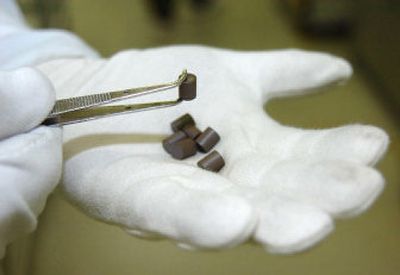Brazil also enriching uranium

RESENDE, Brazil – As Iran faces international pressure over developing the raw material for nuclear weapons, Brazil is quietly preparing to open its own uranium-enrichment center, capable of producing exactly the same fuel.
Brazil – like Iran – has signed the Nuclear Nonproliferation Treaty, and Brazil’s constitution bans the military use of nuclear energy.
Also like Iran, Brazil has cloaked key aspects of its nuclear technology in secrecy while insisting the program is for peaceful purposes, claims nuclear weapons experts have debunked.
While Brazil is more cooperative than Iran on international inspections, some worry its new enrichment capability – which eventually will create more fuel than is needed for its two nuclear plants – suggests that South America’s biggest nation may be rethinking its commitment to nonproliferation.
“Brazil is following a path very similar to Iran, but Iran is getting all the attention,” said Marshall Eakin, a Brazil expert at Vanderbilt University. “In effect, Brazil is benefiting from Iran’s problems.”
While Iran leads a war of words against nuclear-armed Israel and has defied a U.N. Security Council request to stop all uranium enrichment, Brazil is peaceful and democratic. It doesn’t have border disputes, is not in an arms race, and strives for good relations with all nations. Its last war ended in 1870.
“Brazil doesn’t cheat on the Nonproliferation Treaty and it does not exist in an area of high tension,” said David Albright, a former U.N. inspector who runs the Washington-based Institute for Science and International Security.
The U.S. Embassy in the capital, Brasilia, referred all questions to the State Department in Washington, where spokesman Sean McCormack dismissed any parallel between Brazil’s nuclear program and Iran’s.
Still, Brazil’s enrichment program – and its reluctance to allow unlimited inspections – has raised suspicions abroad.
“Brazil is beginning to be perceived as a country apparently wanting to reevaluate its commitment to nonproliferation, and this is a big part of the problem,” said Jon Wolfsthal, deputy director for nonproliferation at the Carnegie Endowment for International Peace in Washington.
The government-run Industrias Nucleares do Brasil S.A. has been conducting final tests at the enrichment plant, built on a former coffee plantation in Resende, 90 miles west of Rio de Janeiro. When it opens this year, Brazil will join the world’s nuclear elite.
Brazil has the world’s sixth-largest uranium reserves, but until the plant becomes operational, it can’t use the fuel for energy without shipping it to and from URENCO, the European enrichment consortium.
Brazil says its plant will be capable of enriching natural uranium to less than 5 percent uranium-235, an isotope needed to fuel its two reactors. Warheads need ore that has been enriched to 95 percent uranium-235, a material Brazil says it can’t and won’t produce.
“If you can enrich to 5 percent, you’re decades away from enriching to 90 percent,” Odair Dias Goncalves, president of the Brazilian Nuclear Energy Commission, told the Associated Press.
But former U.N. inspector Albright said he worked with Goncalves at the Brazilian Physics Society on a project to show that the Brazilian centrifuges could be used to produce highly enriched uranium, even if that wasn’t their intended use.
“Centrifuges are very flexible,” he said. “Reconfiguring the cascades or recycling the enriched uranium multiple times can allow for the production of weapons-grade uranium.”
Brazilian leaders insist the fuel will be used for the nation’s $1 billion nuclear energy industry. Already Latin America’s biggest nuclear power provider, Brazil plans up to seven new atomic plants to reduce its dependence on oil and hydroelectric power and plans to export enriched uranium to provide energy for other countries.